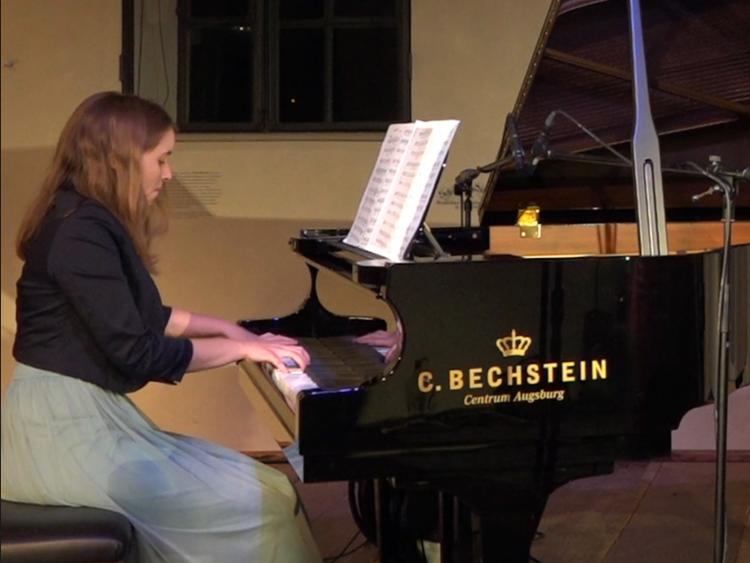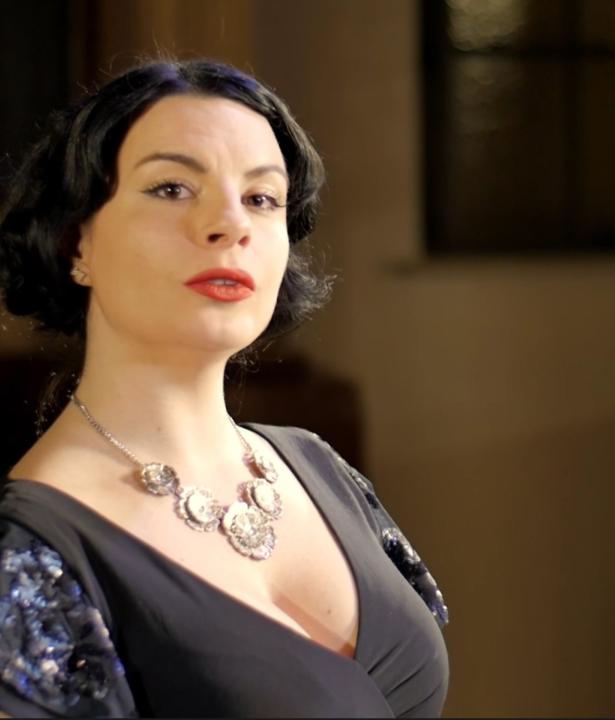Ciprian Porumbescu (music and text) / Mia Jakob (soprano), Denise Maurer (piano)
Text
A native of the Bukovinian village of (Romanian: Șipotele Sucevei, now Шепіт/Ukraine), Romanian composer Ciprian Porumbescu (1853–1883) began his musical studies in and , then studied in Vienna with Anton Bruckner (1824–1896) and Eusebius Mandyczewski (1857–1929). Despite his short life – he died of tuberculosis at the age of 29 in in Suceava County – Porumbescu left behind a body of work that played a seminal role in the development of Romanian art music.
Schepit
ron. Șipotele Sucevei, pol. Szipot Kamerale, ukr. Шепіт, rus. Шепот
Černivci
ron. Cernăuţi, deu. Czernowitz, heb. צֶ׳רנוֹבִיץ, heb. Tschernowitz, yid. טשערנאָװיץ, yid. Tschernowitz, rus. Черновцы, rus. Tschernowzy, ukr. Чернівці, deu. Tschernowitz
Chernivtsi (Ukra. Чернівці) is a large city in southwestern Ukraine. The city is located on the border with Romania and is widely considered to be the capital of the historic Bukovina region. Chernivtsi was an significant place of Jewish culture. In 2017 Chernivtsi had about 62,000 inhabitants.
Due to the war in Ukraine, it is possible that this information is no longer up to date.
Ciprian Porumbescu
ron. Stupca, deu. Stupka
The village formerly called Stupca is located in the now Romanian part of Bukovina about 25 km southwest of Suceava. In 1954 it was renamed Ciprian Porumbescu in honor of the composer.
In addition to piano works and chamber music, Porumbescu composed Crai nou (1882), probably the first Romanian operetta. He also composed the music of the former Romanian national anthem Trei culori (Three Colors) and today’s Albanian national anthem Himni i Flamurit (Hymn to the Flag). With his Romances for voice and piano, as well as more than 200 choral compositions, he also strove to influence musical pedagogy and to improve the general understanding of music. His folkloristic Ballad for violin and piano, written in 1880 is still particularly popular in Romania today. After 1945, Porumbescu also became an important cultural figure in Romania; the two-part biographical film Ciprian Porumbescu (directed by Gheorghe Vitanidis), which was released in 1973, contributed to this.
Text
Text
The work Resignation (Romanian: Resemnare), written in the tradition of the romantic German art song, was composed during Porumbescu’s time as a student in Vienna. Here, rather than setting a foreign text to music, he wrote the strongly autobiographical piece himself. In it, he dealt with his hopeless love for Berta Gorgon, the daughter of a Protestant priest from Stupca, whose parents forbade her to marry Porumbescu, who was the son of an Orthodox priest, for confessional reasons. Porumbescu had Resignation, together with the music manuscripts of two other songs, bound in a red velvet album bearing the initials of the dedicatee. In March 1881 he enclosed the album with a letter to Berta Gorgon, in which he declared his love to her in vain.
Text
Mia Jakob was born in Zagreb, Croatia, where she completed her master's degree in music education at the Academy of Music in 2014. In 2017, she began a master's degree in voice at the Leopold Mozart Center in Augsburg, Germany, graduating in 2021. In addition to her pedagogical work and artistic activities as an opera singer, her focus is on combining film with opera and song.
<www.miajakob.com>{#2611}
Denise Maurer is currently completing her Master's degree in "Klavier" (piano) at the Leopold Mozart Center in Augsburg. Together with the singer Mia Jakob, she has on several occasions provided the musical framework for events organized by the Bukovina Institute in Augsburg. Maurer graduated from the University of Music in Munich with a bachelor's degree in artistic-pedagogical piano and a master's degree in music journalism. In addition to her pedagogical and artistic activities, she is a freelance journalist for the Neue Musikzeitung as well as BR-Klassik.
<www.miajakob.com>{#2611}
Denise Maurer is currently completing her Master's degree in "Klavier" (piano) at the Leopold Mozart Center in Augsburg. Together with the singer Mia Jakob, she has on several occasions provided the musical framework for events organized by the Bukovina Institute in Augsburg. Maurer graduated from the University of Music in Munich with a bachelor's degree in artistic-pedagogical piano and a master's degree in music journalism. In addition to her pedagogical and artistic activities, she is a freelance journalist for the Neue Musikzeitung as well as BR-Klassik.
Text
English translation: William Connor
Externe Links










